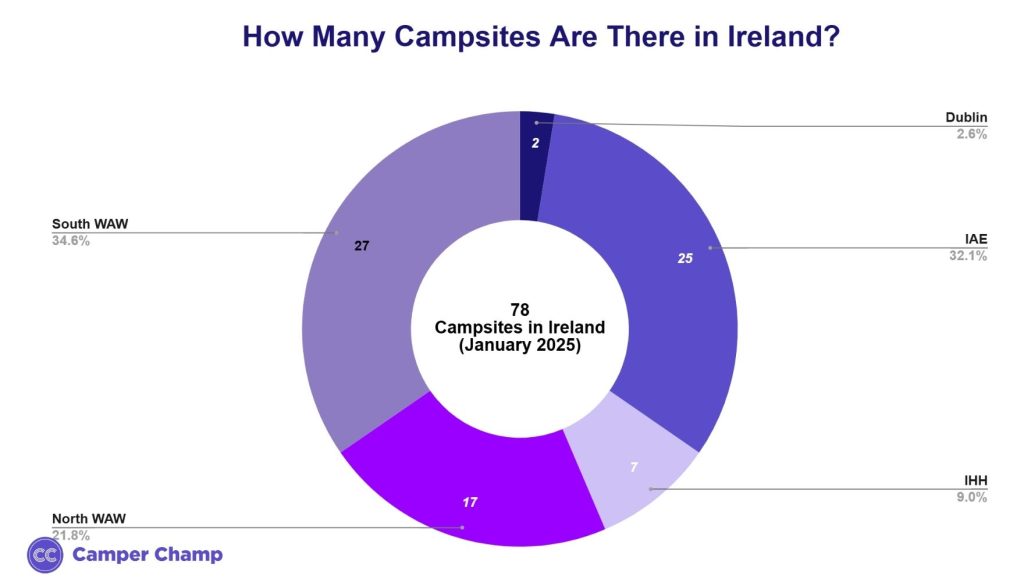Page last updated: 13 May 2025
The camping sector is a growing component of Ireland’s tourism industry and is popular both with domestic and international travellers.
How many campsites are there in Ireland?
As of January 2025, Ireland had 78 registered and approved caravan and camping parks.
- The number of officially registered campsites decreased from 132 in 2000, 93 in 2011 and down to 78 parks in 2025, a 41% overall decline since 2000.
- The caravan and camping parks are primarily located in South Wild Atlantic Way (27 parks) and Ireland’s Ancient East (25 parks).

What is the total capacity of campsites in Ireland?
The 78 registered campsites in Ireland have a total capacity of 5,975 units or pitches, which translates to approximately 24,000 bed spaces.
- The total number of available pitches decreased from 8,405 in 2000 to 5,432 in 2011.
- Between 2011 and 2025, pitches increased slightly to 5,975, despite fewer registered parks.
Capacity of Campsites by Regions in Ireland (January 2025)
| Region | Units/ Pitches | Bed Space |
| Dublin | 277 | 1,534 |
| IAE | 2,320 | 9,363 |
| IHH | 281 | 1,198 |
| North WAW | 1,248 | 4,392 |
| South WAW | 1,849 | 7,572 |
How popular is camping in Ireland?
- Camping in Ireland is in high demand with 60% pitch occupancy for 2023, up 4% from 2022.
Learn more about Camping Statistics in Europe.
Ireland Travel Resources
How much does camping cost in Ireland?
Camping prices in Ireland vary depending on accommodation type, facilities, location and season. In 2025 prices range from €15 per night for basic tent pitches to over €225 for luxury glamping options.
- Basic, non-powered grass tent pitches for two adults cost between €15 and €30 per night.
- Powered pitches for tents, caravans or motorhomes for two adults from €23 to €40 or more per night.
- Basic glamping units like pods or bell tents from €60-€90 per night.
- Luxury glamping options like cabins, treehouses or shepherd’s huts from €130 to over €225 per night.
- Extra charges apply for extra people, electricity usage and awnings.
Cost of Camping in Ireland
| Units/ Pitches | Cost (per night) |
| Basic, non-powered grass tent pitches | €15-€30 |
| Powered pitches | €23-€40 |
| Basic glamping units | €60-€90 |
| Luxury glamping options | €130-€225 |
Which counties have the most Campsites?
- Kerry and Cork have the highest number of campsites in Ireland, with 13 and 11, respectively.
- Mayo, Tipperary, Clare and Waterford offer between 5 to 7 campsites.
Distribution of Campsites by Counties (January 2025)
| County | Number of Campsites |
| Cavan | 1 |
| Clare | 5 |
| Cork | 11 |
| Donegal | 4 |
| Dublin | 2 |
| Galway | 4 |
| Kerry | 13 |
| Kilkenny | 2 |
| Leitrim | 2 |
| Limerick | 1 |
| Louth | 1 |
| Mayo | 7 |
| Roscommon | 2 |
| Sligo | 3 |
| Tipperary | 7 |
| Waterford | 5 |
| Wexford | 4 |
| Wicklow | 4 |
What facilities and amenities do campsites offer?
- All registered sites have reception buildings, toilet and shower facilities with hot and cold running water, laundry facilities, safe drinking water supply and waste disposal systems.
What proportion of campsites in Ireland are eco-certified?
- Clifden Eco Beach Camping & Caravanning Park is the only campsite in Ireland with gold level certification from the Sustainable Tourism Network.
What is the economic impact of campsites?
- The market size of the Caravan and Camping Sites industry in Ireland is €50.2 million in 2025.
- In 2024, 206 businesses operated in Ireland’s Caravan and Camping Sites industry with a CAGR of 3.6% from 2019 to 2024.
- As of 2024, there are 225 employees in the industry.
Trends and developments in Irish camping
- Glamping expansion: Unique, comfortable accommodation combining outdoor with hotel-like amenities is attracting new demographics who are less likely to camp.
- Sustainability: Environmental practices are getting more important, some operators are going for renewable energy, waste reduction and ecological responsibility, but formal certification is limited.
- Technology: Advanced booking systems, AI tools and digital management solutions are key to operational efficiency and guest expectations.
- Experience stays: Modern travellers want unique, memorable experiences and specific atmospheres not just basic accommodation.
- Seasonality: Extending the season is a big opportunity to grow business.
